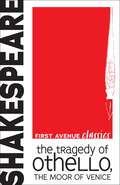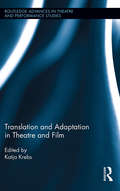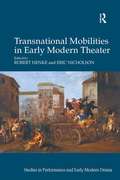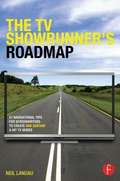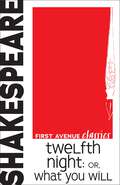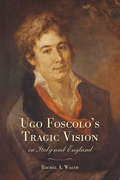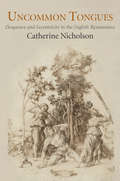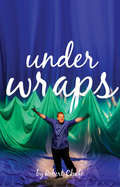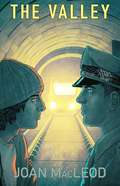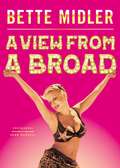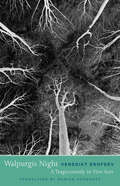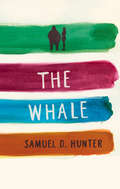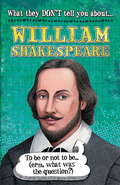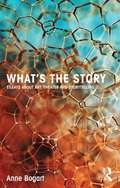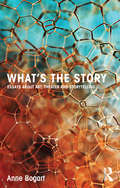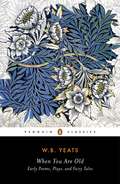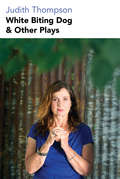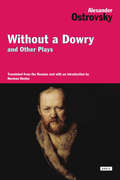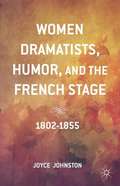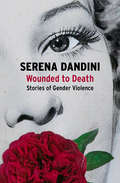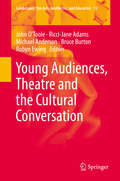- Table View
- List View
The Tragedy of Othello, the Moor of Venice: Edited, With Notes (classic Reprint) (First Avenue Classics ™)
by William ShakespeareOthello, a general in the Venetian army, has married the lovely Desdemona, and Roderigo is not at all happy. He was hoping to woo Desdemona for himself. Roderigo's jealousy is all Iago, Roderigo's sneaky friend, needs, as he has his own reasons to be angry with Othello. By weaving an intricate web of deceit, infidelity, and envy, Iago is able to plant false suspicions and lead people to commit crimes that will destroy the relationships dearest to them. This is an unabridged version of one of William Shakespeare's most famous tragedies, first published in England in 1622.
Translation and Adaptation in Theatre and Film (Routledge Advances in Theatre & Performance Studies)
by Katja KrebsThis book provides a pioneering and provocative exploration of the rich synergies between adaptation studies and translation studies and is the first genuine attempt to discuss the rather loose usage of the concepts of translation and adaptation in terms of theatre and film. At the heart of this collection is the proposition that translation studies and adaptation studies have much to offer each other in practical and theoretical terms and can no longer exist independently from one another. As a result, it generates productive ideas within the contact zone between these two fields of study, both through new theoretical paradigms and detailed case studies. Such closely intertwined areas as translation and adaptation need to encounter each other’s methodologies and perspectives in order to develop ever more rigorous approaches to the study of adaptation and translation phenomena, challenging current assumptions and prejudices in terms of both. The book includes contributions as diverse yet interrelated as Bakhtin’s notion of translation and adaptation, Bollywood adaptations of Shakespeare’s Othello, and an analysis of performance practice, itself arguably an adaptive practice, which uses a variety of languages from English and Greek to British and International Sign-Language. As translation and adaptation practices are an integral part of global cultural and political activities and agendas, it is ever more important to study such occurrences of rewriting and reshaping. By exploring and investigating interdisciplinary and cross-cultural perspectives and approaches, this volume investigates the impact such occurrences of rewriting have on the constructions and experiences of cultures while at the same time developing a rigorous methodological framework which will form the basis of future scholarship on performance and film, translation and adaptation.
Transnational Mobilities in Early Modern Theater (Studies in Performance and Early Modern Drama)
by Robert Henke Eric NicholsonThe essays in this volume investigate English, Italian, Spanish, German, Czech, and Bengali early modern theater, placing Shakespeare and his contemporaries in the theatrical contexts of western and central Europe, as well as the Indian sub-continent. Contributors explore the mobility of theatrical units, genres, performance practices, visual images, and dramatic texts across geo-linguistic borders in early modern Europe. Combining 'distant' and 'close' reading, a systemic and structural approach identifies common theatrical units, or 'theatergrams' as departure points for specifying the particular translations of theatrical cultures across national boundaries. The essays engage both 'dramatic' approaches (e.g., genre, plot, action, and the dramatic text) and 'theatrical' perspectives (e.g., costume, the body and gender of the actor). Following recent work in 'mobility studies,' mobility is examined from both material and symbolic angles, revealing both ample transnational movement and periodic resistance to border-crossing. Four final essays attend to the practical and theoretical dimensions of theatrical translation and adaptation, and contribute to the book’s overall inquiry into the ways in which values, properties, and identities are lost, transformed, or gained in movement across geo-linguistic borders.
The TV Showrunner's Roadmap: 21 Navigational Tips for Screenwriters to Create and Sustain a Hit TV Series
by Neil LandauIf you've ever dreamed of being in charge of your own network, cable, or web series, 'The TV Showrunner's Roadmap' provides you with the tools for creating, writing, and managing your own hit show. Combining his 20+ years as a working screenwriter and UCLA professor, Neil Landau expertly guides you through 21 essential insights to the creation of a successful show, and takes you behind the scenes for exclusive and enlightening interviews with showrunners from some of TV's most lauded series.
Twelfth Night: or, What You Will (First Avenue Classics ™)
by William ShakespeareIn the kingdom of Illyria, a love triangle has everyone on edge. Orsino loves Olivia, a bereaved noblewoman who is in mourning for her dead brother. Olivia loves Cesario, who is actually a woman named Viola. Viola had dressed as a man in order to gain employment in Orsino's household. Viola, of course, falls in love with Orsino, and he has no knowledge of the true identity of his "male" servant, Cesario. A romantic romp full of tricks, twists, and happy reunions, this unabridged version of William Shakespeare's classic comedy was first published in England in 1623.
Ugo Foscolo's Tragic Vision in Italy and England
by Rachel A. WalshOne of the most celebrated Italian writers of the early Romantic period, Ugo Foscolo (1778-1827) was known primarily as a novelist, a poet, and a nationalist. Following the Napoleonic Wars, he lived in self-exile in England during the last decade of his life. There he wrote numerous critical essays and collaborated with Lord Byron and other well-known members of English literary circles.Ugo Foscolo's Tragic Vision in Italy and England examines an underexplored aspect of Foscolo's literary career: his tragic plays and critical essays on that genre. Rachel A. Walsh argues that for Foscolo tragedy was more than another genre in which to exercise his literary ambitions. It was the medium for an elaborate life-long process of self-examination and engagement with political and literary conflict. By analysing Foscolo's tragic struggles on and off the stage, Walsh sheds new light on his career and how it reflects on the important literary and political trends of the time.
Uncommon Tongues: Eloquence and Eccentricity in the English Renaissance
by Catherine NicholsonIn the late sixteenth century, as England began to assert its integrity as a nation and English its merit as a literate tongue, vernacular writing took a turn for the eccentric. Authors such as John Lyly, Edmund Spenser, and Christopher Marlowe loudly announced their ambitions for the mother tongue--but the extremity of their stylistic innovations yielded texts that seemed hardly English at all. Critics likened Lyly's hyperembellished prose to a bejeweled "Indian," complained that Spenser had "writ no language," and mocked Marlowe's blank verse as a "Turkish" concoction of "big-sounding sentences" and "termes Italianate. " In its most sophisticated literary guises, the much-vaunted common tongue suddenly appeared quite foreign. In Uncommon Tongues, Catherine Nicholson locates strangeness at the paradoxical heart of sixteenth-century vernacular culture. Torn between two rival conceptions of eloquence, savvy writers and teachers labored to reconcile their country's need for a consistent, accessible mother tongue with the expectation that poetic language depart from everyday speech. That struggle, waged by pedagogical theorists and rhetoricians as well as authors we now recognize as some of the most accomplished and significant in English literary history, produced works that made the vernacular's oddities, constraints, and defects synonymous with its virtues. Such willful eccentricity, Nicholson argues, came to be seen as both the essence and antithesis of English eloquence.
Under Wraps
by Robert ChafeThe moment Mark meets David his world is thrown off balance. Who could have predicted finding love in a furniture store, or finding it with an unemployed lifeguard? But despite their immediate connection, Mark isn’t sure if David is gay. Mark isn’t even sure if Mark is gay. As he falls deeper in love, Mark works desperately to make David nothing more than a friend and to make that enough. Filled with hopeful exhilaration and devastating missed opportunities, Under Wraps nimbly tracks one man’s tumultuous quest to finally love himself and let it all out.
The Valley
by Joan Macleod"MacLeod has a wonderful ear and eye for the everyday details."--Calgary HeraldInspired by the 2007 Tasering death of Robert Dziekanski at the Vancouver airport, The Valley dramatizes the volatile relationship between law enforcement and people in the grip of mental illness. The play connects both sides of this relationship by portraying two families embattled with depression, each guided by good intentions but challenged by their own flawed humanity.Joan MacLeod is the author of numerous award-winning plays. Her work has been translated into more than eight languages with productions throughout the world, including a sold-out run in New York.
A View from A Broad
by Bette MidlerBette Midler, also known as Divine Miss M--the indomitable and incomparable singer, actor, and musical theater extraordinaire, with a career spanning almost half a century--revisits her classic memoir, now with a new introduction.This book was a kind of last hurrah. When I read it, I hear a disarmingly younger, sweeter voice...I am not sure that this little confection captures a whole time, but I think it's an accurate picture of the spirit and tone of what I was doing in those days...I hope it holds up, and that you find your best younger self in it as I do... With her brassy voice and bold performances making the world finally pay attention, this ambitious Jewish girl from Hawaii, needs no introduction. Grammy award-winning singer, Academy Award-nominee, Broadway star of her critically acclaimed one-woman show, and beloved actress in The Rose, Beaches, and Down and Out in Beverly Hills--Bette Midler is a household name whose career and fans span generations. In A View from A Broad, Bette relives her career through memories of endless rehearsals, her fear of flying, crazy schedules, and wisdom she learned from Thai Gondoliers with her trademark razor-blade wit that her fans have grown to know, love, and expect. Filled with photographs, a new introduction, and heartwarming stories that highlight only a portion of a brilliant career, A View from a Broad is the perfect gift for anyone who loves music, theater, or just plain fun--and will be cherished by the fans of Divine Miss M for years to come.
Walpurgis Night, or the Steps of the Commander
by Marian Schwartz Venedikt ErofeevWalpurgis Night, by acclaimed Russian writer Venedikt Erofeev, is considered a classic in the playwright's homeland. Erofeev's dark and funny five-act satire of Soviet repression has been called the comic high-water mark of the Brezhnev era. Walpurgis Night dramatizes the outrageous trials of Lev Isakovich Gurevich, an alcoholic half-Jewish dissident poet confined by the state to a hospital for the insane. In "Ward 3"--a microcosm of repressive Soviet society--Gurevich deploys his brilliant wit and ingenuity to bedevil his jailers, defend his fellow inmates, protest his incarceration, and generally create mayhem, which ultimately leads to a tragedy of Shakespearean proportions.
The Whale / A Bright New Boise
by Samuel D. HunterAcclaimed for his gentle, complex characterizations, Hunter's big-hearted, fiercely funny plays explore the quiet desperation running through many Middle American lives: The Whale tells the story of a man's last chance at redemption and of discovering beauty in the most unexpected places, and A Bright New Boise is a philosophical investigation of faith and search for meaning in rural Idaho.
What They Don't Tell You About: William Shakespeare
by Anita GaneriDid you know that Shakespeare couldn't spell his own surname? Love him or hate him, everyone has heard of the world's most famous playwright. But did the Elizabethans think he was a genius or simply that he wrote great soap operas? Any book on Shakespeare will give you the boring facts THEY think you should know, but only this one will tell you what the bard and his mates were REALLY like ... Uncover a wealth of information about Shakespeare! Find out where he was born and look at his family tree, see a map of Shakespeare's Stratford and Shakespeare's London, find out what school was like in Shakespeare's time, what London life was like and what sort of people went to the theatre. See a cross-section illustration of the Globe and discover how special effects were created and what actors wore. Read biographies of famous actors of the era such as Edward Alleyn, Richard Burbage, Richard Tarlton and William Kempe as well as biographies of contemporary writers Ben Jonson, Thomas Kyd and Christopher Marlowe. Read famous quotes and sayings and whizz your eye over a timeline of Shakespeare's plays and of his life. This book will tell you what Shakespeare's longest or shortest play is, or even which is the most miserable or goriest? It includes plots and information about ten of Shakespeare's plays: Richard III; Romeo and Juliet; A Midsummer Night's Dream; The Merchant of Venice; Henry V; Twelfth Night; Hamlet; Othello; Macbeth and The Tempest. It highlights some of Shakespeare's funniest characters and some of those that were in love. It concludes looking at how Shakespeare died, and discusses whether Shakespeare was, in fact, Sir Francis Bacon, Edward De Vere, Roger Manners, William Stanley or Christopher Marlowe. Finally, test your knowledge of all you've read with a fun 20-question quiz.
What's The Story: Essays About Art, Theater And Storytelling
by Anne BogartAnne Bogart is an award-winning theatre maker, and a best-selling writer of books about theatre, art, and cultural politics. In this her latest collection of essays she explores the story-telling impulse, and asks how she, as a ‘product of postmodernism’, can reconnect to the primal act of making meaning and telling stories. She also asks how theatre practitioners can think of themselves not as stagers of plays but ‘orchestrators of social interactions’ and participants in an on-going dialogue about the future.
What's the Story: Essays about art, theater and storytelling
by Anne BogartAnne Bogart is an award-winning theatre maker, and a best-selling writer of books about theatre, art, and cultural politics. In this her latest collection of essays she explores the story-telling impulse, and asks how she, as a ‘product of postmodernism’, can reconnect to the primal act of making meaning and telling stories. She also asks how theatre practitioners can think of themselves not as stagers of plays but ‘orchestrators of social interactions’ and participants in an on-going dialogue about the future. We dream. And then occasionally we attempt to share our dreams with others. In recounting our dreams we try to construct a narrative... We also make stories out of our daytime existence. The human brain is a narrative creating machine that takes whatever happens and imposes chronology, meaning, cause and effect... We choose. We can choose to relate to our circumstances with bitterness or with openness. The stories that we tell determine nothing less than personal destiny. (From the introduction) This compelling new book is characteristically made up of chapters with one-word titles: Spaciousness, Narrative, Heat, Limits, Error, Politics, Arrest, Empathy, Opposition, Collaboration and Sustenance. In addition to dipping into neuroscience, performance theory and sociology, Bogart also recounts vivid stories from her own life. But as neuroscience indicates, the event of remembering what happened is in fact the creation of something new.
When You Are Old: Early Poems, Plays, and Fairy Tales
by William Butler Yeats Rob DoggettRecalling Yeats's 1890s fascination in aestheticism and the arts and crafts movement, selections will draw from the first published versions of poems from works such as Crossways, The Rose, The Wind Among the Reeds, In the Seven Woods, The Green Helmet and Other Poems, Responsibilities, The Wild Swans at Coole, and Michael Robartes and the Dancer. A selection Irish myths and fairytales including "The Wanderings of Oisin," a Celtic fable and his first major poem, represent his fascination with mysticism, spiritualism and the rich and imaginative heritage of his native land.
White Biting Dog and Other Plays
by Judith ThompsonThis book collects some of Judith Thompson’s earlier, hard-to-find plays, including White Biting Dog, a poetic black comedy about a divorced lawyer who prepares to kill himself by jumping off the Bloor Street Viaduct—until he encounters a small dog who sets him on a different path; I Am Yours, a harrowing story about a group of characters on the brink of despair as each tries to escape what haunts them the most; and Pink, a moving monologue set in 1970s South Africa that centres on a young girl’s surprising reaction after her nanny is murdered during a protest.
Why Theatre Matters
by Kathleen GallagherWhat makes young people care about themselves, others, their communities, and their futures? In Why Theatre Matters, Kathleen Gallagher uses the drama classroom as a window into the daily challenges of marginalized youth in Toronto, Boston, Taipei, and Lucknow. An ethnographic study which mixes quantitative and qualitative methodology in an international multi-site project, Why Theatre Matters ties together the issues of urban and arts education through the lens of student engagement. Gallagher's research presents a framework for understanding student involvement at school in the context of students' families and communities, as well as changing social, political, and economic realities around the world.Taking the reader into the classroom through the voices of the students themselves, Gallagher illustrates how creative expression through theatre can act as a rehearsal space for real, material struggles and for democratic participation. Why Theatre Matters is an invigorating challenge to the myths that surround urban youth and an impressive study of theatre's transformative potential.
William Shakespeare (What They Don't Tell You About #29)
by Anita GaneriDid you know that Shakespeare couldn't spell his own surname?Love him or hate him, everyone has heard of the world's most famous playwright. But did the Elizabethans think he was a genius or simply that he wrote great soap operas? Any book on Shakespeare will give you the boring facts THEY think you should know, but only this one will tell you what the bard and his mates were REALLY like ...Uncover a wealth of information about Shakespeare! Find out where he was born and look at his family tree, see a map of Shakespeare's Stratford and Shakespeare's London, find out what school was like in Shakespeare's time, what London life was like and what sort of people went to the theatre. See a cross-section illustration of the Globe and discover how special effects were created and what actors wore. Read biographies of famous actors of the era such as Edward Alleyn, Richard Burbage, Richard Tarlton and William Kempe as well as biographies of contemporary writers Ben Jonson, Thomas Kyd and Christopher Marlowe. Read famous quotes and sayings and whizz your eye over a timeline of Shakespeare's plays and of his life.This book will tell you what Shakespeare's longest or shortest play is, or even which is the most miserable or goriest? It includes plots and information about ten of Shakespeare's plays: Richard III; Romeo and Juliet; A Midsummer Night's Dream; The Merchant of Venice; Henry V; Twelfth Night; Hamlet; Othello; Macbeth and The Tempest. It highlights some of Shakespeare's funniest characters and some of those that were in love.It concludes looking at how Shakespeare died, and discusses whether Shakespeare was, in fact, Sir Francis Bacon, Edward De Vere, Roger Manners, William Stanley or Christopher Marlowe.Finally, test your knowledge of all you've read with a fun 20-question quiz.
Without a Dowry and Other Plays
by Alexander OstrovskyOne of the most important Russian playwrights of the nineteenth century, Alexander Ostrovsky (1823-1886) is credited with bringing realism to the Russian stage. Contemporary of Turgenev, Dostoevsky, and Tolstoy and precursor to Chekhov, he was a keen sociological observer, often exposing abuses of power, landing him in trouble with the censors again and again. He wrote 47 original plays and began the tradition of acting today associated with Stanislavsky. Ostrovsky’s plays were written with performance in mind and with a masterful use of colloquial language. To this day they are a much-performed part of the Russian repertory. This volume collects four of Ostrovsky’s key plays, each from a different decade-A Profitable Position, An Ardent Heart, Without a Dowry, and Talents and Admirers, and is rounded out by the translator’s introduction, an afterword for each play, an extensive bibliography, and complete list of Ostrovsky’s works. .
Women and Shakespeare in the Eighteenth Century
by Fiona RitchieFiona Ritchie analyses the significant role played by women in the construction of Shakespeare's reputation which took place in the eighteenth century. The period's perception of Shakespeare as unlearned allowed many women to identify with him and in doing so they seized an opportunity to enter public life by writing about and performing his works. Actresses (such as Hannah Pritchard, Kitty Clive, Susannah Cibber, Dorothy Jordan and Sarah Siddons), female playgoers (including the Shakespeare Ladies Club) and women critics (like Charlotte Lennox, Elizabeth Montagu, Elizabeth Griffith and Elizabeth Inchbald), had a profound effect on Shakespeare's reception. Interdisciplinary in approach and employing a broad range of sources, this book's analysis of criticism, performance and audience response shows that in constructing Shakespeare's significance for themselves and for society, women were instrumental in the establishment of Shakespeare at the forefront of English literature, theatre, culture and society in the eighteenth century and beyond.
Women Dramatists, Humor, and the French Stage
by Joyce JohnstonFilling a critical void, this book examines French women dramatists of the nineteenth century who managed to have their works staged prior to the lifting of censorship laws in 1864. Sophie de Bawr (1773 1860), Sophie Gay (1776 1852), Virginie Ancelot (1792 1875), and Delphine Gay de Girardin (1804 1855) all staged successful plays at Paris's top venues (Theatre Francais and Odeon) or at other selective theatres (Ambigu-Comique, Vaudeville, Gymnase) during this period without the aid or protection of a male coauthor. Between 1802 and 1855, all four of these dramatists were heavily involved in the literary scene of their day and hosted their own salons, venues essential for any male author wishing to see his works published and accepted among the public. While not always directly engaged in the politics of the day in their theater, these dramatists were aware of and influenced by the public sphere. Though none staged what today's critics would refer to as overtly feminist drama, through their use of humor, Bawr, Gay, Ancelot, and Girardin all cast aspersion upon patriarchal dominance and reconstructed ideals of womanhood that rejected traditional submissive roles. "
The World of Tacitus' Dialogus de Oratoribus
by Christopher S. van den BergComing to terms with the rhetorical arts of antiquity necessarily illuminates our own ideas of public discourse and the habits of speech to which they have led. Tacitus wrote the Dialogus at a time (ca. 100 CE) when intense scrutiny of the history, the definitions, and the immediate relevance of public speech were all being challenged and refashioned by a host of vibrant intellects and ambitious practitioners. This book challenges the notion that Tacitus sought to explain the decline of oratory under the Principate. Rather, from examination of the dynamics of argument in the dialogue and the underlying literary traditions there emerges a sophisticated consideration of eloquentia in the Roman Empire. Tacitus emulates Cicero's legacy and challenges his position at the top of Rome's oratorical canon. He further shows that eloquentia is a means by which to compete with the power of the Principate.
Wounded to Death
by Serena DandiniThe voices too many women have lost; the dreams too many men have destroyed In these monologues originally written for theatrical performance, women who were victims of murder regain their voices to tell their truths. One woman, her body unceremoniously dumped in a well by her husband, laments the police force's halfhearted investigation of her murder. Another, forced to toil ceaselessly for a meager few euros per month, grows weary of enduring daily beatings and attempted rape and hangs herself from a crystal chandelier. Inspired by true events, these monologues represent what the victims of femicide might say, had they not been robbed of their voices. First staged as a play in 2012 in Palermo, Italy, Wounded to Death has taken Italy and the world by storm. Alongside the powerfully imagined speeches in this edition, Serena Dandini presents the grim global statistics of violence against women. This essential book showcases the author's exceptional capacity for creating nuanced emotion, from comic to painful, from grotesque to dramatic. With a factual basis and cinematic flair, these works compel the reader to consider the violence that is taking place right now all over the world.
Young Audiences, Theatre and the Cultural Conversation
by John O'Toole Ricci-Jane Adams Michael Anderson Bruce Burton Robyn EwingThis volume offers rare insights into the connection between young audiences and the performing arts. Based on studies of adolescent and post-adolescent audiences, ages 14 to 25, the book examines to what extent they are part of our society's cultural conversation. It studies how these young people read and understand theatrical performance. It looks at what the educational components in their theatre literacy are, and what they make of the whole social event of theatre. It studies their views on the relationship between what they themselves decide and what others decide for them. The book uses qualitative and quantitative data collected in a six-year study carried out in the three largest Australian States, thirteen major performing arts companies, including the Sydney Opera House, three state theatre companies and three funding organisations. The book's perspectives are derived from world-wide literature and company practices and its significance and ramifications are international. The book is written to be engaging and accessible to theatre professionals and lay readers interested in theatre, as well as scholars and researchers. "This extraordinary book thoroughly explains why young people (ages 14-25+) do and do not attend theatre into adulthood by delineating how three inter-linked factors (literacy, confidence, and etiquette) influence their decisions. Given that theatre happens inside spectators' minds, the authors balance the theatre equation by focusing upon young spectators and thereby dispel numerous beliefs held by theatre artists and educators. Each clearly written chapter engages readers with astute insights and compelling examples of pertinent responses from young people, teachers, and theatre professionals. To stem the tide of decreasing theatre attendance, this highly useful book offers pragmatic strategies for artistic, educational, and marketing directors, as well as national theatre organizations and arts councils around the world. I have no doubt that its brilliantly conceived research, conducted across multiple contexts in Australia, will make a significant and original contribution to the profession of theatre on an international scale. " Jeanne Klein, University of Kansas, USA "Young Audiences, Theatre and the Cultural Conversation is a compelling and comprehensive study on attitudes and habits of youth theatre audiences by leading international scholars in the field. This benchmark study offers unique insights by and for theatre makers and administrators, theatre educators and researchers, schools, parents, teachers, students, audience members of all ages. A key strength within the book centers on the emphasis of the participant voices, particularly the voices of the youth. Youth voices, along with those of teachers and theatre artists, position the extensive field research front and center. " George Belliveau, The University of British Columbia, Canada
